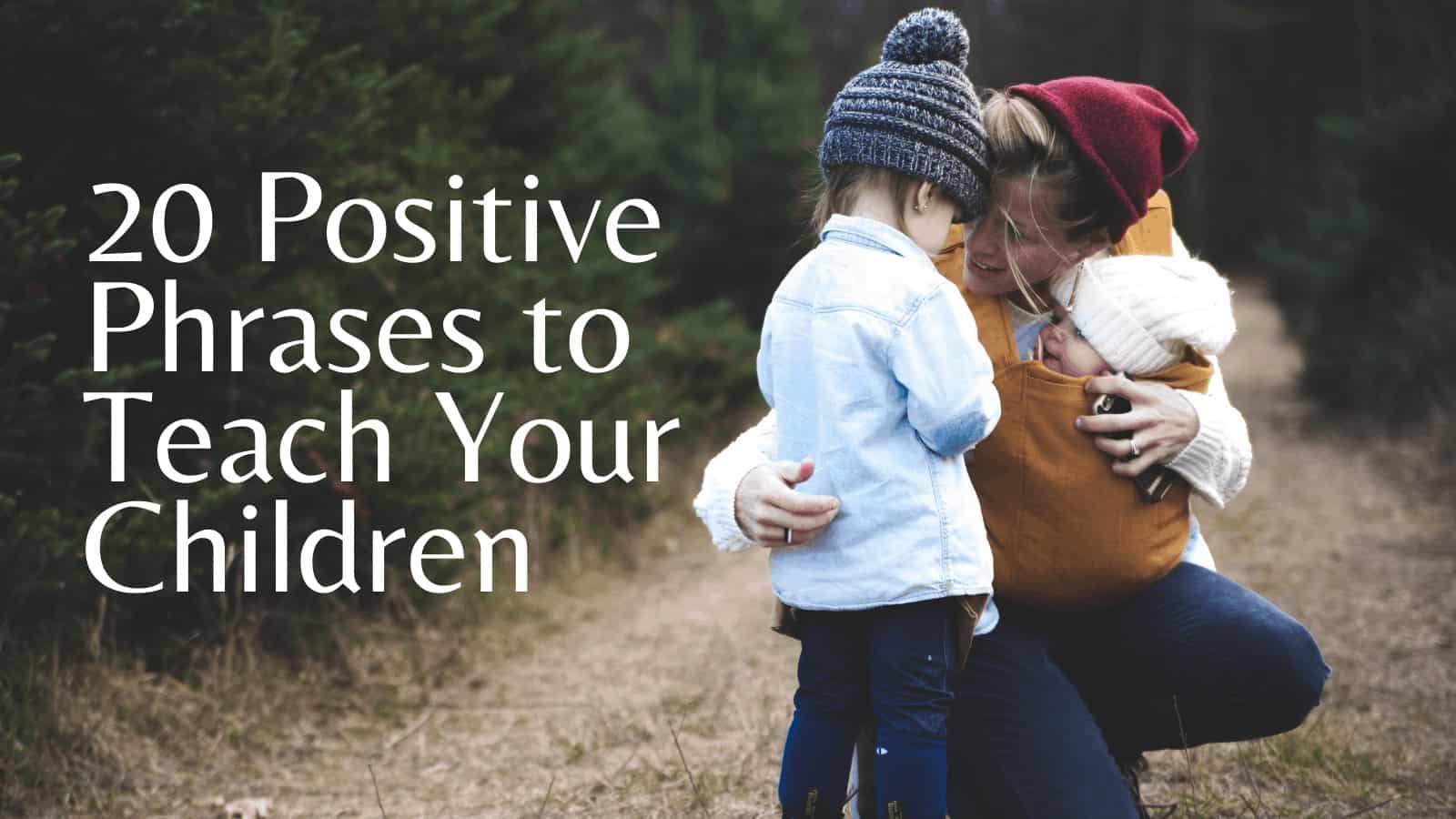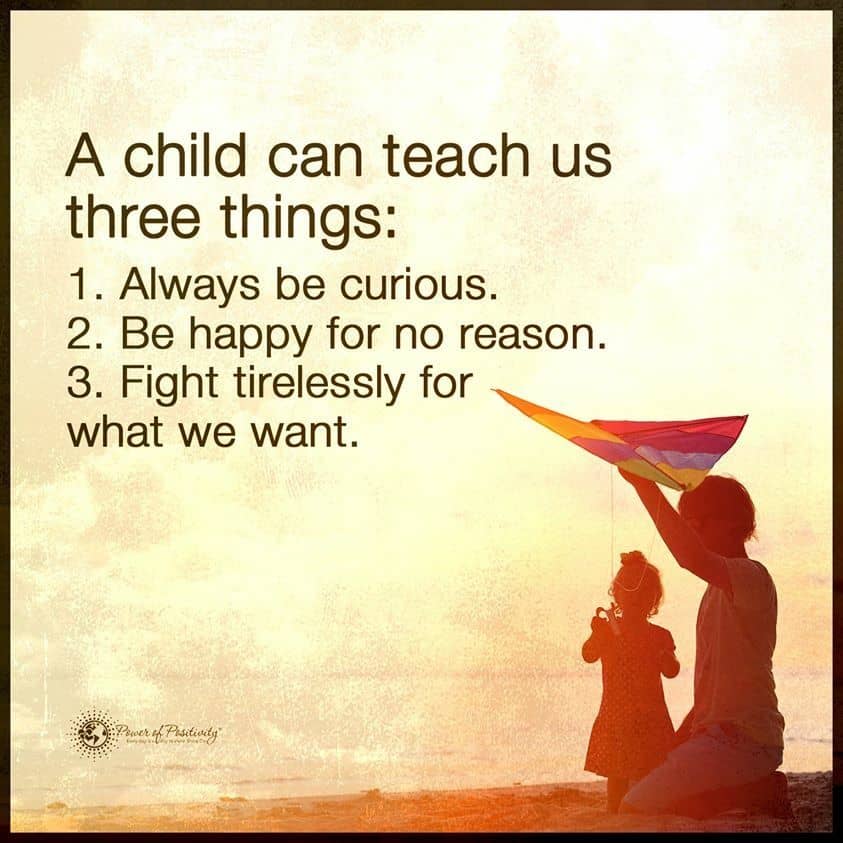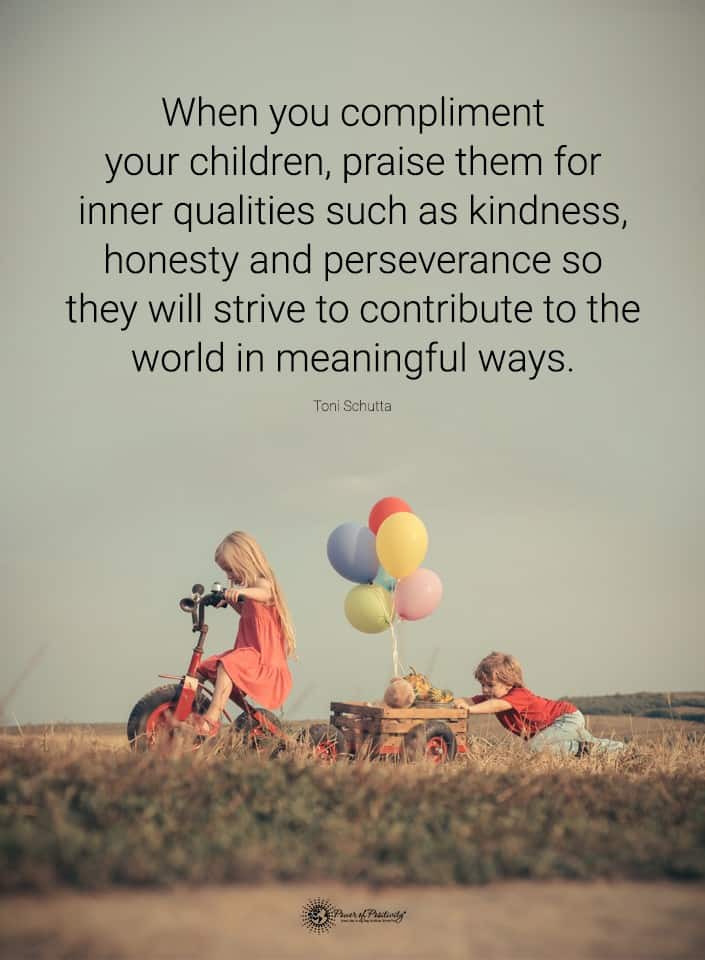Positivity will make your child feel good about themselves and the world around them. It is important to teach your child to be positive, and one good way to do this is by using positive phrases. Using positive phrases, you will be encouraging positivity, confidence, development, learning, and an overall sense of well-being and self-worth.
Using positive words with your children can make your bond stronger, too. Your children will be more responsible and will be less likely to rebel. Plus, they will be more likely to talk to you about things that are going on in their life.
These positive phrases are useful when you speak them, but they go much farther than that. The words you say to your child stick with them forever, and they will think back on them in times of need. If you use positive words regularly, your child will be more likely to think positively when faced with a challenge.
Positive Phrases to Teach Your Children
Set your child up to be successful even when you aren’t right by their side. Use these positive phrases to teach your children, and your children will know what to do when facing a challenge. They will be able to make the right choices and remain confident as they have fun.
1. “I am proud of you.”
When children know that you are proud of them, they’ll want to do even better. They will work to make you proud and continue with the positive behavior they had been exhibiting.
2. “Think about how you can solve the problem.”
Don’t solve problems for your child. Instead, please encourage them to figure things out for themselves.
When they can figure out another way to do something, they’ll be learning and developing. This will also allow the child to see that they can still do things even when there is a problem.
3. “When you mess up, it is a chance to learn.”
Don’t scold your child when they mess up. Scolding will make them think that there is something wrong with making mistakes.
Instead, let them know that everyone makes mistakes and that mistakes are a learning opportunity. Explain that when someone messes up, it’s a way of figuring out what not to do next time.
4. “Pause and breathe. Take a deep breath.”
When you see your child getting overwhelmed, remind them to pause and take a breath. This will help them refocus and calm down. Teaching them this phrase will help them in many instances that cause overwhelming feelings.
5. “You are loved.”
Children need to know that they are loved. Telling them often will let them know that you love them unconditionally. Plus, children who know they are loved will be more confident.
6. “I love spending time with you.”
If your child knows you like spending time with them, they will behave better. Plus, they will rebel less and open up more. Forming a tighter bond and letting your child know you enjoy their company can make all the difference for them.
7. “Don’t give up.”
Teaching your child to keep trying despite anything that happens will help them get farther in life. They will know that they can do anything if they keep trying and work hard. When they accomplish what they were aiming for, the excitement and empowerment they feel will be life-changing.
8. “You are working hard!”
Make sure to emphasize how important hard work is for success and that working hard is more important than the result. It will teach children to embrace obstacles and use them as learning opportunities.
9. “You are kind and thoughtful.”
By recognizing a child’s good behaviors, they will be more likely to continue that behavior. When you see positive characteristics like this in your child, make sure to acknowledge them. Replace the characteristics in this phrase with ones that apply to your child to help develop those positive qualities.
10. “Thank you for being a helper.”
Your child will help more often if you praise their efforts. Let them know that you appreciate their help, and they’ll want to help you and others all the time.
11. “You can do anything you set your mind to.”
Teach your child that anything is possible. They can reach their dreams and figure things out as long as they set their mind to it.
12. “It is okay to say no. You can’t make everyone happy.”
One of the best phrases to teach your children is that it is okay to say no. They can say no when they don’t feel comfortable or don’t want to do something. Teach them that it is okay if someone isn’t happy about it because it isn’t possible to make everyone happy.
13. “Participating, having fun, and trying your best is more important than winning.”
This phrase teaches your child not to sit out if they aren’t the best at something. It teaches them to get out there and participate even if winning isn’t guaranteed. This positive phrase could lead to many fun memories, lots of confidence, and it will build their skill levels.
14. “I know you are doing your best.”
Children like it when you notice that they are trying their best. Even when they didn’t get something perfect, this phrase will encourage them to keep trying hard. Recognizing their attempt will keep them from giving up and will give them more confidence in the future.
15. “Maybe it is time for a break. You can come back to it.”
Kids can quickly become frustrated when things aren’t going as well as they’d hoped. When they work on something such as building with Legos and can’t get the pieces perfect, they may become upset.
Teach them that when this happens, it might be time for a break. Coming back to it later with a clear head could make all the difference. Doing this teaches a child to self-regulate their emotions.
16. “You are so creative.”
Please encourage your child to tap into their creative side by acknowledging their abilities. This phrase will give them confidence and make them want to be even more creative. When they show you their artwork or creation, use this positive phrase to encourage and inspire them.
17. “It is okay to ask for help.”
Asking for help can be hard for adults, and even more so for children. Teach your children that there is nothing wrong with asking someone for help when they need it. Getting help is a good opportunity for learning and growth, and everyone can do better with a little help.
18. “You are important.”
Children need to know that they are important, valuable, and cherished. Remind them of this as often as you can so that they will know their worth. They will have more confidence and self-respect, and they will be more likely to respect others.
19. “The way you are feeling is normal.”
Don’t shame your child for being angry, sad, frustrated, confused, or any other emotion. Instead, teach them that feeling emotion is normal and okay. From there, teach them positive ways to work through their feelings.
20. “I can see that you have been practicing!”
Noticing when your child has been practicing is a sure way to boost their confidence. Plus, it will show them how much you pay attention to what they do. This acknowledgment will promote more practice and hard work, growth, and learning in your child.
Other Ways to Promote Positivity in Your Children
Using positive phrases isn’t the only way to promote positivity in your children. You can give your child positive attention in other ways, too, including:
- smiling at them
- making eye contact
- using facial expressions that show you care
- hugging your child
- showing interest in their hobbies
- asking them about what they are doing
- acknowledging their achievements
- paying attention when your child is talking to you
- spending quality time with them
- comforting your child when they are sad
- showing that you are excited to see them
- watching them when they are doing something that they enjoy
Final Thoughts on Positive Phrases to Teach Your Children
Teaching children to be positive and develop is easy with these positive phrases to teach your children. When you regularly use positive words with your children, they will develop positive qualities and characteristics, including confidence and a sense of self-worth.
The words you speak to your child will affect them instantly. Plus, they will stick with your child throughout their life. Your words are the ones that come back to them as they face challenges and think of solutions.
Make sure that the words your child is hearing are positive ones by using these positive phrases. Please help your child and set them up for success and happiness by always being positive. Remember these phrases when you speak to your children, and you’ll never run out of positive things to say.

















 Community
Community

